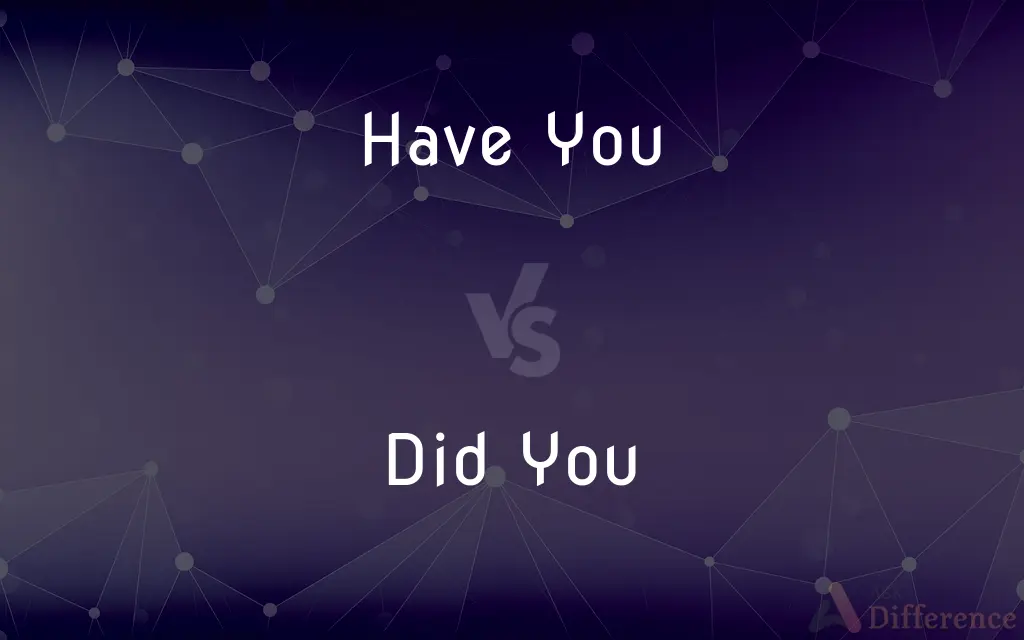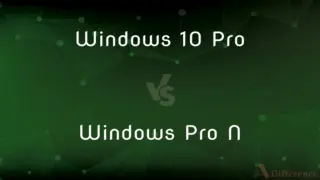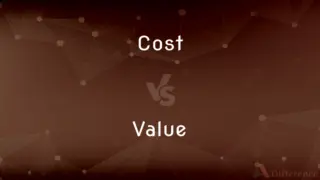Have You vs. Did You — What's the Difference?
Edited by Tayyaba Rehman — By Fiza Rafique — Published on December 15, 2023
"Have You" is used for questions in the present perfect tense, referring to experiences or actions related to the present. "Did You" is used for questions in the simple past tense, focusing solely on past actions.

Difference Between Have You and Did You
Table of Contents
ADVERTISEMENT
Key Differences
"Have You" is employed to frame questions within the present perfect tense. This implies an inquiry into experiences or actions that, while starting in the past, maintain relevance or connection to the present moment. On the other side, "Did You" sets questions within the simple past tense, concentrating only on actions or events that took place in the past.
When one inquires using "Have You," they're often seeking to understand if someone has ever had a particular experience or if a certain event has occurred up to the current time. In contrast, questions posed with "Did You" look back to specific past moments, searching for precise details or information.
Let's take an example to distinguish the two: Using "Have You," one might ask, "Have you ever visited Paris?" indicating a general inquiry about a life experience. Meanwhile, using "Did You," one might ask, "Did you visit Paris last summer?" pinpointing a specific time frame in the past.
"Have You" questions often carry an implied sense of continuity or current relevance. For instance, "Have you finished your homework?" implies that the action's completion (or lack thereof) holds significance now. "Did You," however, is devoid of such implications. Asking, "Did you do your homework yesterday?" is strictly retrospective.
In essence, "Have You" and "Did You" are tools for framing questions, but they operate within different tenses and possess distinct implications about time and relevance.
ADVERTISEMENT
Comparison Chart
Grammatical Form
Present perfect tense
Simple past tense
Time Reference
Refers to actions relevant to now or general experiences
Refers to specific past actions/events
Continuation/Relevance
Implies action may have relevance to present
No implication of present relevance
Typical Question Focus
Life experiences or recent actions
Specific events in the past
Example
"Have you seen this movie?"
"Did you see that movie last week?"
Compare with Definitions
Have You
Used for framing questions about life experiences.
Have you ever been to New York?
Did You
Explores actions bound to precise moments in the past.
Did you hear that song on the radio this morning?
Have You
Questions actions or states with present relevance.
Have you finished the book yet?
Did You
Seeks information about past occurrences.
Did you get my message the other day?
Have You
Generally explores actions not bound to specific past times.
Have you tried the new restaurant downtown?
Did You
Used for asking about specific past actions or events.
Did you attend the meeting yesterday?
Have You
Seeks confirmation of actions with current implications.
Have you submitted the assignment?
Did You
A tool for inquiring about actions within a specific past timeframe.
Did you travel last summer?
Have You
Inquires about events occurring up to now.
Have you heard the latest news?
Did You
Questions actions that have no present implication.
Did you like the movie you watched last weekend?
Common Curiosities
What's the negative response to a "Have You" question?
Typically, "No, I haven't."
Is "Did You" used for specific past events?
Yes, "Did You" focuses on specific actions or events in the past.
Can "Have You" inquire about general life experiences?
Yes, "Have You" often asks about general life experiences not bound to a specific time.
Can "Have You" ask about recent actions?
Yes, "Have You" can inquire about recent actions or states relevant to now.
Which tense is associated with "Have You"?
"Have You" is associated with the present perfect tense.
How do you respond negatively to a "Did You" question?
Usually, "No, I didn't."
Does "Did You" carry present implications?
No, "Did You" questions are strictly retrospective without present relevance.
When do I use "Have You" in a question?
Use "Have You" for questions about experiences or actions with relevance to the present.
What tense does "Did You" belong to?
"Did You" is used in the simple past tense.
Can "Did You" pinpoint exact times in the past?
Yes, "Did You" questions can focus on precise moments or periods in the past.
How do I frame a question about someone's past travel?
Both can be used, but differ in nuance: "Have you been to Italy?" vs. "Did you go to Italy last year?"
Is "Did You" used for habits?
Generally, no. "Did You" asks about specific instances or actions in the past.
Are "Have You" questions about unspecified times?
Often, yes. They ask about actions/events without specifying when they occurred.
Does "Have You" suggest the possibility of repetition?
Not necessarily. It can, but often it just inquires about a single occurrence or general experience.
Are both forms common in daily English conversations?
Absolutely. Both "Have You" and "Did You" are frequently used depending on the context and intended meaning.
Share Your Discovery

Previous Comparison
Windows 10 Pro vs. Windows Pro N
Next Comparison
Cost vs. ValueAuthor Spotlight
Written by
Fiza RafiqueFiza Rafique is a skilled content writer at AskDifference.com, where she meticulously refines and enhances written pieces. Drawing from her vast editorial expertise, Fiza ensures clarity, accuracy, and precision in every article. Passionate about language, she continually seeks to elevate the quality of content for readers worldwide.
Edited by
Tayyaba RehmanTayyaba Rehman is a distinguished writer, currently serving as a primary contributor to askdifference.com. As a researcher in semantics and etymology, Tayyaba's passion for the complexity of languages and their distinctions has found a perfect home on the platform. Tayyaba delves into the intricacies of language, distinguishing between commonly confused words and phrases, thereby providing clarity for readers worldwide.












































